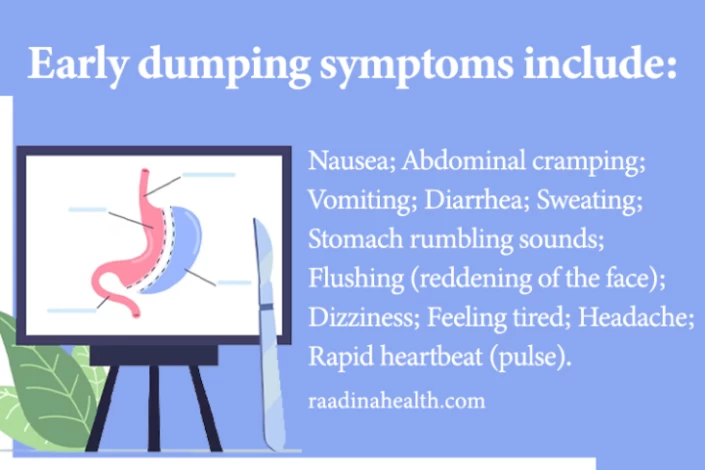Can you Get Dumping Syndrome After Gastric Sleeve Surgery?
Weight Loss Surgery
astric sleeve surgery, a popular weight loss procedure, has transformed the lives of countless people struggling with obesity. This bariatric surgery helps patients achieve significant and sustainable weight loss by removing a significant portion of the stomach. However, like any surgical procedure, it comes with potential complications, one of which is dumping syndrome.
Dumping syndrome occurs when food moves too quickly from the stomach to the small intestine, leading to uncomfortable and often distressing symptoms such as nausea, vomiting, diarrhea, and abdominal cramping. While dumping syndrome is a common occurrence after gastric sleeve surgery, it is usually manageable with proper understanding and adherence to lifestyle modifications and dietary adjustments.
This article delves into the complexities of this condition, providing a comprehensive overview of its underlying mechanisms, common symptoms, and effective treatment options. By empowering patients with the knowledge and practical strategies, we aim to help them navigate the challenges associated with dumping syndrome and optimize their post-gastric sleeve recovery.

What Is Dumping Syndrome?
Dumping syndrome is a condition that occurs after eating, usually within 15-30 minutes and is characterized by a variety of unpleasant symptoms. It arises due to the rapid emptying of food from the stomach into the small intestine, leading to a rapid influx of food into the intestines.
"Dumping" refers to food being thrown into the small intestine too quickly. This rapid emptying can occur for various reasons. Still, it is often a consequence of surgical procedures that alter the stomach's anatomy, such as gastric bypass or sleeve surgery. These surgeries significantly reduce the size of the stomach, altering the normal digestive process and contributing to the rapid emptying of food.
What Are the Different Types of Dumping Syndrome?
There are two main types of dumping syndrome:
- Early Dumping Syndrome: This occurs shortly after eating, usually within 10-30 minutes, and is caused by the rapid emptying of food from the stomach into the small intestine;
- Late Dumping Syndrome: This occurs 1-3 hours after eating and is caused by a sudden drop in blood sugar levels (hypoglycemia). The rapid release of sugar into the small intestine triggers an excessive insulin release, leading to low blood sugar levels.
What Are the Causes of Dumping Syndrome?
Dumping syndrome is caused by the rapid passage of food from the stomach into the small intestine, which can happen after surgical procedures such as gastric sleeve surgery that alter the stomach's size or function. Dumping syndrome causes are:
- Reduced Stomach Size: After surgery, the stomach is smaller, meaning it can hold less food. This can lead to food being emptied quickly into the small intestine, overwhelming the body's ability to process it;
- Changes in Stomach Function: The surgery alters the stomach's normal emptying rate and hormone release. This can lead to an imbalance in the digestive process and trigger the symptoms of dumping syndrome;
- Dietary Factors: Eating large meals and high-sugar, high-fat foods can worsen dumping syndrome. These foods can stimulate the release of hormones that speed up stomach emptying.

Who Is More at the Risk of Dumping Syndrome after Gastric Sleeve Surgery?
Certain patients may be more likely to experience dumping syndrome after gastric sleeve surgery. These include:
- Individuals with a history of gastrointestinal disorders, such as gastroesophageal reflux disease (GERD) or irritable bowel syndrome (IBS);
- Patients who have undergone previous gastrointestinal surgeries;
- People who have a family history of gastrointestinal issues or a genetic predisposition to digestive problems;
- Individuals with certain medical conditions, such as diabetes or hypoglycemia;
- Patients who do not adhere to post-operative dietary guidelines consume high amounts of sugar or carbs after surgery or eat large meals quickly.
What Are the Symptoms of Dumping Syndrome after Gastric Sleeve Surgery?
The symptoms of dumping syndrome can vary depending on whether it is early or late dumping syndrome.
Early dumping symptoms include:
- Nausea;
- Abdominal cramping;
- Vomiting;
- Diarrhea;
- Stomach rumbling sounds;
- Sweating;
- Flushing (reddening of the face);
- Dizziness;
- Feeling tired;
- Headache;
- Rapid heartbeat (pulse).

Late dumping symptoms include:
- Weakness;
- Fast heartbeat;
- Dizziness;
- Sweating;
- Fatigue;
- Low blood sugar (hypoglycemia);
- Shakiness;
- Hunger;
- Confusion.
The severity of dumping syndrome symptoms varies from person to person and can range from mild discomfort to severe. It's important to note that not everyone who has gastric sleeve surgery will experience dumping syndrome, and symptoms typically lessen over time as the body adjusts to the changes in digestion.
How Is Dumping Syndrome after Gastric Sleeve Surgery Diagnosed?
Dumping syndrome after gastric sleeve surgery is typically diagnosed based on a patient's symptoms and medical history. The doctor may also order further tests to confirm the diagnosis. These tests may include glucose tolerance tests, imaging tests like an upper endoscopy, or gastric emptying studies.
How to Treat or Manage Dumping Syndrome after Gastric Sleeve Surgery?
The treatment for dumping syndrome typically involves a combination of dumping syndrome treatment at home, including dietary modifications, lifestyle changes, and, in some cases, medication.
Here is what to do during a dumping syndrome episode to manage syndromes:
Follow the dumping syndrome diet
Adjusting your diet can play a key role in managing dumping syndrome. This may include
- Eat small, frequent meals throughout the day and avoid large meals or high-fat, high-sugar foods that can trigger dumping syndrome;
- Avoid or limit foods high in sugar, such as candy, pastries, sugary drinks, and desserts. These can trigger rapid spikes in blood sugar levels and contribute to dumping syndrome symptoms.;
- Focus on consuming protein-rich foods, complex carbohydrates, and fiber like poultry, fish, eggs, tofu, and legumes to help slow down digestion and stabilize blood sugar levels;
- Avoid drinking fluids 30 minutes before and after meals to prevent rapid stomach emptying.
Make lifestyle change
Lifestyle changes that can help manage and reduce symptoms of dumping syndrome are:
- Eat slowly and chew food thoroughly;
- Avoid lying down immediately after eating and staying upright for at least 30 minutes after meals to help food digest properly;
- Engage in light physical activity, such as walking, after meals.

Medications
In some cases, medications such as acarbose or octreotide may be prescribed to help manage the symptoms of dumping syndrome. These medications can slow down food movement through the digestive system and stabilize blood sugar levels.
Surgical interventions
In rare cases where severe dumping syndrome symptoms persist and do not respond to conservative measures, surgical interventions such as conversion to a different bariatric procedure or revision surgery may be considered.
When to See a Doctor?
You should seek medical attention for dumping syndrome after gastric sleeve surgery if you experience severe or persistent symptoms, such as:
- Significant weight loss;
- Dehydration;
- Frequent or severe episodes of nausea, vomiting, diarrhea, or abdominal pain;
- Difficulty managing your diet or maintaining adequate nutrition;
- Lightheadedness or fainting;
- Rapid or irregular heartbeat.

Gastric Sleeve Surgery in Iran
Iran has emerged as a leading destination for gastric sleeve surgery, attracting patients from across the globe seeking high-quality, affordable care. The country boasts a strong network of experienced and qualified surgeons, many trained in reputable international institutions. These surgeons utilize advanced techniques and state-of-the-art facilities. These skilled professionals are committed to delivering personalized care and ensuring patient safety and satisfaction throughout the surgical journey.
Moreover, Iran offers a compelling value proposition for those seeking weight-loss surgery. Compared to many developed nations, the cost of gastric sleeve surgery in Iran is significantly lower, making it a financially attractive option. Additionally, the country boasts world-class hospitals and clinics that adhere to international hygiene and safety standards, providing a comfortable and well-equipped environment for patient recovery.
Furthermore, Iran's rich culture and vibrant heritage offer a unique blend of medical tourism and cultural exploration. Patients can immerse themselves in the country's historical sites, bustling bazaars, and delicious cuisine while recovering from their procedure.
Final Word
Dumping syndrome is a common side effect that can arise after gastric sleeve surgery. Patients must know the symptoms and take steps to prevent and manage this condition. By following a proper diet, eating small meals, and avoiding high-sugar foods, patients can greatly reduce their risk of experiencing dumping syndrome.

FAQs
1) How long does dumping syndrome last after gastric sleeve?
Early dumping syndrome typically lasts for 3 to 4 months after gastric sleeve surgery as the body adjusts to the changes in digestion and metabolism. Late dumping syndrome can extend for up to a year following the procedure and may endure for several years.
2) Can dumping syndrome be prevented after gastric sleeve surgery?
Preventing dumping syndrome after gastric sleeve surgery may involve following dietary guidelines provided by your bar, eating smaller meals, avoiding high-sugar foods, and staying well-hydrated.
3) Is dumping syndrome dangerous?
Dumping syndrome can be uncomfortable and disruptive, but it is not typically dangerous. However, in some cases, severe dumping syndrome symptoms such as low blood sugar (hypoglycemia) may occur, which can be potentially dangerous.
4) How to get rid of dumping syndrome fast
There is no quick fix or cure for dumping syndrome, as it is a complex condition that requires careful management and lifestyle adjustments. While there are strategies to help alleviate symptoms, such as eating smaller, more frequent meals, avoiding high-sugar and high-fat foods, and staying hydrated, these changes may take time to produce noticeable results.
5) Are there any long-term complications associated with dumping syndrome after gastric sleeve surgery?
In some cases, persistent or severe dumping syndrome may lead to nutritional deficiencies or weight loss if not managed effectively.

No reviews
Your comment